After a week or more stuck in cities – charming as they were – I was really keen to get out of the sightseeing loop and go do something a bit more adventurous than walk through a museum. After Shiraz, the next destination on my itinerary was the south-eastern town of Kerman which I was very excited about due to its proximity to the Dasht-e Lut desert and a formation of eroded rocks called the Kaluts. I didn’t really plan on doing anything much in Kerman except for a trip out to the Kaluts, so as soon as my bus pulled into the terminal (in the middle of a huge dust storm) I dropped my bag at a dodgy guesthouse and went in search of someone to take me there.
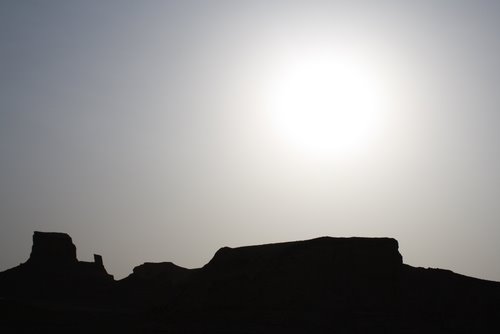
Two driver/tour operators are listed in the Lonely Planet. Hossein Vatani, whose “ancient Jeep seems permanently incapacitated”, competes against a rival operator who is “better organised, but not as fun as, Hossein Vatani”. No competition, then – Hossein it is. I got in touch with Hossein on the phone and arranged to meet him in a chaykhaneh (teahouse) in the middle of the bazaar (he maintains an office but it quickly became apparent that he does most of his business over tea.) Hossein is a middle-aged man with a friendly face, a gentle demeanour, and a quiet dignity, and I very quickly took a liking to him. We shared a pot of tea before getting down to business and as much as I would’ve loved to do his overnight camping trip to the Kaluts I simply couldn’t afford it unless other travellers arrived to share the cost. I arranged to head off to another couple of places that I wanted to see in the vicinity of Kerman and call Hossein each day to see if others have booked for the tour.
The next day as I was preparing to leave for Bam, I phoned Hossein and was excited and surprised to learn that a Welshman had been in touch about going to the Kaluts. Another meeting over tea was arranged for 2pm and I returned to my hotel, joyfully reconfiguring my daypack to camping mode. At the teahouse we decided to head off that afternoon, timing our arrival for around sunset to avoid the ridiculous 50-degree-plus temperatures common in the desert at this time of year, and ordered some more tea. Julian from Wales and I got talking to two young women on the takht (daybed) next to us who were very keen to practise their English and see if we could in any way help them with study visas to our respective countries. Julian received an invitation to marry within the hour and I’m not entirely sure that the issuer was joking.
Back at Hossein’s office we sat on his daybed and watched as he pottered around the place looking for camping gear. He spent ten minutes looking for a list he had written on a scrappy bit of paper somewhere (it wasn’t in any of the drawers, under the bed, in the fridge, or next to the computer) before finding it in his pocket. Then he spent 30 minutes looking for bits of camping stuff stored in random places around the office. Never once did Hossein get flustered or deviate from measured calmness, simply pausing now and again to mop sweat from his face with a large, red handkerchief.
Carrying a large armful of gear each we went downstairs to load the vehicle. When Hossein unlocked a beaten-up old Paykan, Julian and I exchanged looks because facepalming would’ve required dropping stoves and blankets. For those who don’t know, the Paykan is an Iranian-made relic of back-to-the-future mechanical engineering; it’s cute and endearing but unreliable and horribly fuel inefficient. We were going to drive 150km each way into the desert in a car which looked like it would struggle to make it to the shops and back. The first thing Hossein did was pop the hood and pour about three litres of water into the radiator. Reassuring when you’re driving straight into hell. Oh, and then we had to push-start the car because the starter motor was broken.

After stops for food and a giant block of ice for the water container, we were on the way. An upbeat roadtrip vibe took over us all and conversation was animated as we bore through the middle of the enormous Payeh mountain range and set course for the Afghanistan border. The Paykan’s air conditioning was on full with all four windows open and the desert air made it feel like four blast furnaces in the face.
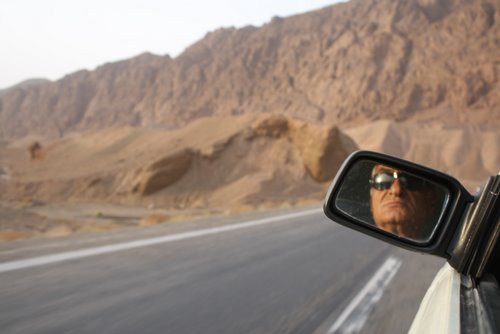
We arrived in the small town of Shahdad (after a stop to replenish the depleted radiator) and gave our details to the police. By this stage we were heading into a controlled section of Iran that is notorious for drug-running and other nefarious activities. From here on in it was desert and the landscape changed suddenly from the relative lushness of the mountain foothills to the flat sparseness of desert. Before too long even the scrubby tundra disappeared and Hossein noted, “That is the last green you’ll see.”
About 30 kilometres later we found ourselves amongst the Kaluts which simply must be seen to be believed. They are similar to the famous eroded hills of the American desert but unique in that they are formed in a strict north-south alignment and seem to pop up out of nowhere. The sun had set about half-an-hour previously and dusk was settling over the land. We pulled off the road (on which we’d seen maybe two other vehicles since we left Shahdad) and drove through the shallow sand to Hossein’s favourite camping place. Unloading the car, despite the near-darkness, it was still bloody hot and sweat poured off us all.
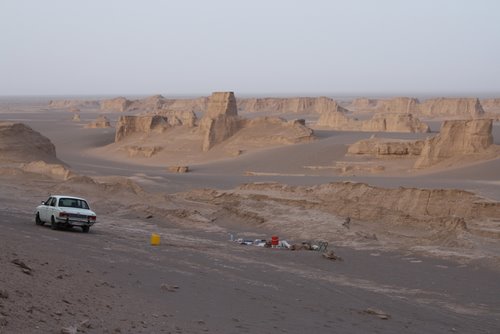
As is typical in Iran, the first priority was tea. Within seconds of arrival the stove was burning and the water was boiling, although in the desert heat it was probably possible to make tea with just a few mirrors. We sat cross-legged on a large plastic sheet, bums and legs burning from the heat radiating from the ground, and made love to hot, sugary chay accompanied by date biscuits. In the middle of the desert in Iran. I just had to remind myself of that fact.
We talked for over an hour about so many topics, each of us genuinely enjoying the company of the others. The full moon started to rise and we knew it was going to be a beautiful, bright night. Hossein asked us if we had any music because he wanted to “feel Welsh or Australian tonight”. iPods and iPhones were employed to program the soundtrack to our camping trip. Hossein started to prepare dinner of eggplant, zucchini, tomato, onion, chili, spice and so much garlic. He put all that on to simmer before crushing it up into a lovely thick mush which went into our bowls along with khashk (a type of hard youghurt mixed with so much garlic), fresh grapes, and chunks of bread. The whole thing, mixed together and eaten with a spoon, was nothing short of divine.
After dinner we lay on our backs on the plastic sheet and each disappeared into our own heads for a while. I watched the clouds moving fast above us (the wind had picked up again), taking note of how their shapes were shifting, and went a little nuts thinking about where I was and what I was doing. We boiled the kettle once more and drank a little tea before bed. Having earlier rolled up my jeans to my knees I grabbed one of the thin blankets, rolled it into a pillow, lay fully clothed on the plastic sheet and fell fast asleep.
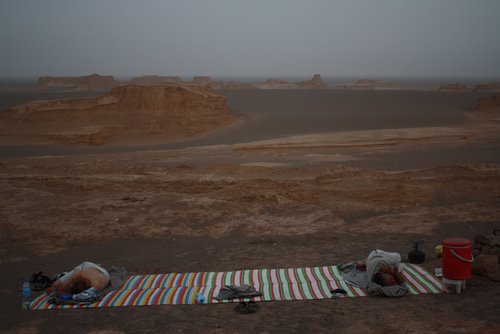
In the morning I was woken by the dawn light and I roused Julian so we could photograph the sunrise. We climbed one of the eroded hills and watched as the sun slowly penetrated the haze on the horizon. As the sun rose higher in the sky the colours of the desert and the Kaluts transitioned through most hues of red, orange, blue and purple. Accompanied by a soundtrack of silence, it was a pretty special morning.
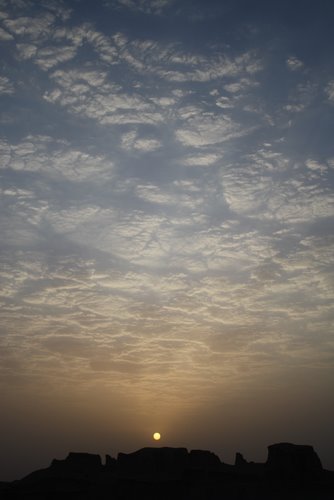
Once we’d all woken up properly we broke camp and headed back towards home. Hossein said he knew of a lovely place to have breakfast and we wouldn’t be disappointed. Tearing up the road at a white-knuckle unknown kph (the speedo was broken) we suddenly braked and turned off onto a tiny, unmarked gravel road. After push-starting the car because it had stalled, we followed a tiny goat track around a corner and right there in front of us was a desert oasis: an underground qanat (water channel) popped its head above the ground for a short distance and at one place broadened into a little gravel pool. The massive system of qanats in desert Iran use gravity to carry mountain water to some of the driest places in the country, and the water in this qanat was crystal-clear and ice-cold. Hossein told us to get in and enjoy, so Julian and I stripped to our underpants and experienced the bliss of cool and fresh water on hot and grotty skin. After we drank tea and ate a beautiful breakfast of tomato, cucumber, figs, cheese, jam and bread, Hossein shed his clothes and joined us for a swim. Swimming in the middle of the desert in Iran. I just had to remind myself of that fact.
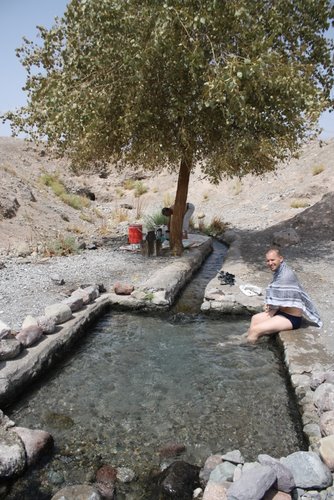
We arrived back to Kerman in the middle of the afternoon and despite being once again caked in sweat, sand and dirt I felt incredibly calm and content. I was immediately jumping on a bus to Bam so I said my goodbyes to Hossein and Julian. As I sat on the bus to Bam I couldn’t help feeling that the past 24 hours had been something incredibly special. I’ll carry the experience with me for a long time.







Crikey is committed to hosting lively discussions. Help us keep the conversation useful, interesting and welcoming. We aim to publish comments quickly in the interest of promoting robust conversation, but we’re a small team and we deploy filters to protect against legal risk. Occasionally your comment may be held up while we review, but we’re working as fast as we can to keep the conversation rolling.
The Crikey comment section is members-only content. Please subscribe to leave a comment.
The Crikey comment section is members-only content. Please login to leave a comment.